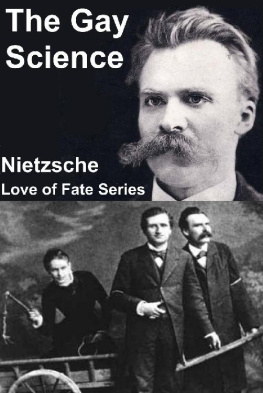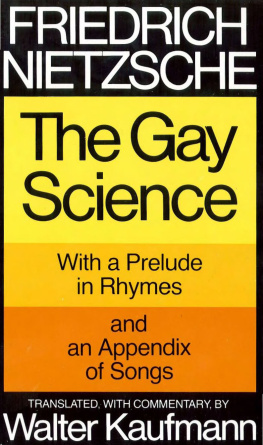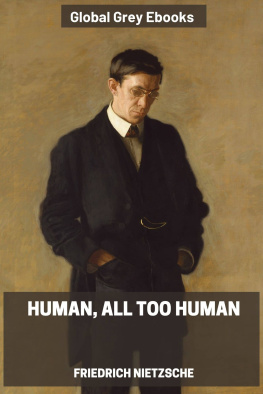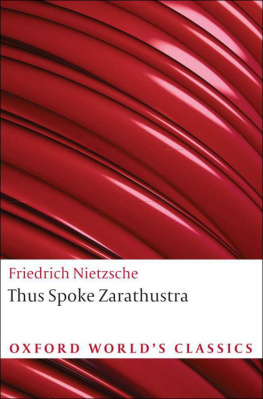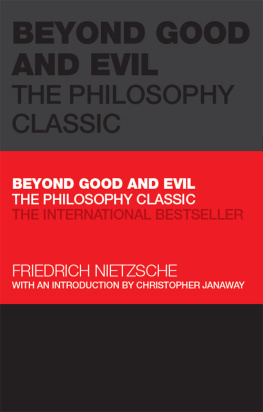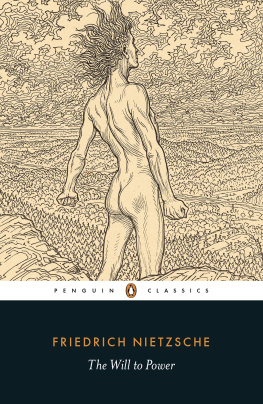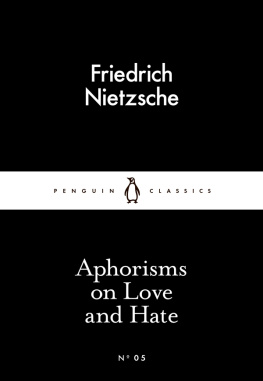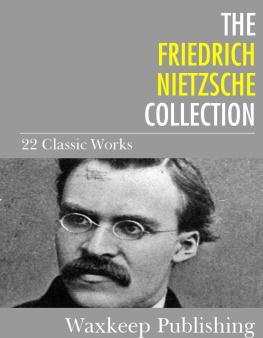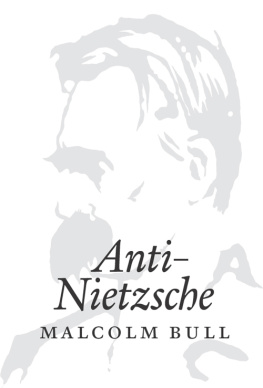Friedrich Nietzsche - A Nietzsche Reader (Penguin Classics)
Here you can read online Friedrich Nietzsche - A Nietzsche Reader (Penguin Classics) full text of the book (entire story) in english for free. Download pdf and epub, get meaning, cover and reviews about this ebook. year: 2003, publisher: Penguin Books, genre: Religion. Description of the work, (preface) as well as reviews are available. Best literature library LitArk.com created for fans of good reading and offers a wide selection of genres:
Romance novel
Science fiction
Adventure
Detective
Science
History
Home and family
Prose
Art
Politics
Computer
Non-fiction
Religion
Business
Children
Humor
Choose a favorite category and find really read worthwhile books. Enjoy immersion in the world of imagination, feel the emotions of the characters or learn something new for yourself, make an fascinating discovery.

- Book:A Nietzsche Reader (Penguin Classics)
- Author:
- Publisher:Penguin Books
- Genre:
- Year:2003
- Rating:3 / 5
- Favourites:Add to favourites
- Your mark:
- 60
- 1
- 2
- 3
- 4
- 5
A Nietzsche Reader (Penguin Classics): summary, description and annotation
We offer to read an annotation, description, summary or preface (depends on what the author of the book "A Nietzsche Reader (Penguin Classics)" wrote himself). If you haven't found the necessary information about the book — write in the comments, we will try to find it.
Friedrich Nietzsche: author's other books
Who wrote A Nietzsche Reader (Penguin Classics)? Find out the surname, the name of the author of the book and a list of all author's works by series.
A Nietzsche Reader (Penguin Classics) — read online for free the complete book (whole text) full work
Below is the text of the book, divided by pages. System saving the place of the last page read, allows you to conveniently read the book "A Nietzsche Reader (Penguin Classics)" online for free, without having to search again every time where you left off. Put a bookmark, and you can go to the page where you finished reading at any time.
Font size:
Interval:
Bookmark:

FRIEDRICH NIETZSCHE was born near Leipzig in 1844, the son of a Lutheran clergyman. He attended the famous Pforta School, then went to university at Bonn and at Leipzig, where he studied philology and read Schopenhauer. When he was only twenty-four he was appointed to the chair of classical philology at Basle University; he stayed there until his health forced him into retirement in 1879. While at Basle he made and broke his friendship with Wagner, participated as an ambulance orderly in the Franco-Prussian War, and published The Birth of Tragedy (1872), Untimely Meditations (18736) and the first part of Human, All Too Human (1878; two supplements entitled Assorted Opinions and Maxims and The Wanderer and his Shadow followed in 1879 and 1880 respectively). From 1880 until his final collapse in 1889, except for brief interludes, he divorced himself from everyday life and, supported by his university pension, he lived mainly in France, Italy and Switzerland. The Dawn appeared in 1881 followed by The Gay Science in the autumn of 1882. Thus Spoke Zarathustra was written between 1883 and 1885, and his last completed books were Ecce Homo, an autobiography, and Nietzsche contra Wagner. He became insane in 1889 and remained in a condition of mental and physical paralysis until his death in 1900.
R. J. HOLLINGDALE translated eleven of Nietzsches books and published two books about him; he also translated works by, among others, Schopenhauer, Goethe, E. T. A. Hoffman, Lichtenberg and Theodor Fontane, many of these for Penguin Classics. He was the honorary president of the British Nietzsche Society. R. J. Hollingdale died on 28 September 2001. In its obituary The Times described him as Britains foremost postwar Nietzsche specialist and the Guardian paid tribute to his inspired gift for German translation. Richard Gott wrote that he brought fresh generations through fluent and intelligent translation to read and relish Nietzsches inestimable thought.
Professor Richard Schacht, Executive Director of the North American Nietzsche Society, said that Hollingdale and Walter Kaufmann, his sometime collaborator, deserve much of the credit for Nietzsches rehabilitation during the third quarter of the twentieth century. It is hard to imagine what Nietzsches fate in the English-speaking world would have been without them. All of us in Nietzsche studies today are in Hollingdales debt.
Selected and translated with an
Introduction by R.J. HOLLINGDALE
PENGUIN BOOKS
PENGUIN BOOKS
Published by the Penguin Group
Penguin Books Ltd, 80 Strand, London WC2R ORL, England
Penguin Putnam Inc., 375 Hudson Street, New York, New York 10014, USA
Penguin Books Australia Ltd, 250 Camberwell Road, Camberwell, Victoria 3124, Australia
Penguin Books Canada Ltd, 10 Alcorn Avenue, Toronto, Ontario, Canada M4V 3B2
Penguin Books India (P) Ltd, 11 Community Centre, Panchsheel Park, New Delhi 110 017, India
Penguin Books (NZ) Ltd, Cnr Rosedale and Airborne Roads, Albany, Auckland, New Zealand
Penguin Books (South Africa) (Pty) Ltd, 24 Sturdee Avenue, Rosebank 2196, South Africa
Penguin Books Ltd, Registered Offices: 80 Strand, London WC2R ORL, England
www.penguin.com
This translation first published in 1977
Reprinted with a new Chronology and Further Reading 2003
Introduction, selection and translation copyright R.J. Hollingdale, 1977
All rights reserved
Except in the United States of America, this book is sold subject to the condition that it shall not, by way of trade or otherwise, be lent, re-sold, hired out, or otherwise circulated without the publishers prior consent in any form of binding or cover other than that in which it is published and without a similar condition including this condition being imposed on the subsequent purchaser
9780141921716
A Nietzsche Reader is a compendium of Nietzsches philosophizing; it offers the reader an overview of that terrain in the hope that he/she will afterwards want to explore it. I have selected from Nietzsches writings passages which I think essential for an understanding of him in the knowledge that no selection can do justice to the work as a whole, and that any selection must to a greater or less extent be a simplification and thus to some extent a falsification of it. This selection from Nietzsche is not presented as a substitute for studying all of Nietzsche: its ambition is to lure on to that undertaking.
A generalizing introduction is, I hope, unnecessary: the compendium ought to explain itself. A passage-by-passage commentary ought likewise to be unnecessary: it ought to be its own commentary Nietzsche commenting on himself. But two kinds of explanation are called for: explanation of the method of selection and of the principle of selection. The method first.
Selection is made from Nietzsches philosophical works: that is, from the series Human, All Too Human (1878) to The Anti-Christ (1888), plus the autobiography Ecce Homo (1888). The works published before Human, the Nachlass and all other writings are excluded. The grounds for this limitation seem to me compelling and to reinforce one another. Firstly: the chief purpose of the Nietzsche Reader is to present Nietzsche as a philosopher, and it is in the series of books referred to that his philosophical opinions are primarily to be discovered. Secondly: a subsidiary purpose is to present Nietzsche as a stylist, and again it is in the series referred to that he so appears these are the mature compositions upon which he in a stylistic sense worked. Third: the present book is intended to be readable straight through: if the selection has been made correctly it is only by reading it straight through that you will derive the maximum benefit from it: but the intrusion of any material other than Nietzsches mature writings would act against this intention (the Nachlass especially, being stylistically no more than notes and jottings, would cause the reader constantly to stumble). Fourth: limitation of space makes rigorous selection a necessity, and in this process the writings of the second rank select themselves out. Fifth: I agree with Karl Schlechta that it is a demand of intellectual tact to understand an author primarily as he wanted himself to be publicly understood and in the present context this means limiting oneself to those works Nietzsche published or intended for publication. Sixth and last: the works from Human to Ecce Homo lend themselves well to excerpting; the immature works before Human do not. A volume of representative extracts would presumably have to include something from The Birth of Tragedy: the purpose of the present volume does not require it.
The construction of the book is as slight as the presuppositions behind it permit. In presentation preserves this development); secondly, that a chronological presentation also preserves the development of his style, the final phase of which is so vastly different from the first that their juxtaposition is not to be thought of except for the purpose (not pursued here) of demonstrating this difference. As a natural consequence of the development of his thinking the proportion of later to earlier work within each section gradually increases: so that, although not explicitly ordered chronologically, the book as a whole possesses a chronological movement.
Font size:
Interval:
Bookmark:
Similar books «A Nietzsche Reader (Penguin Classics)»
Look at similar books to A Nietzsche Reader (Penguin Classics). We have selected literature similar in name and meaning in the hope of providing readers with more options to find new, interesting, not yet read works.
Discussion, reviews of the book A Nietzsche Reader (Penguin Classics) and just readers' own opinions. Leave your comments, write what you think about the work, its meaning or the main characters. Specify what exactly you liked and what you didn't like, and why you think so.

